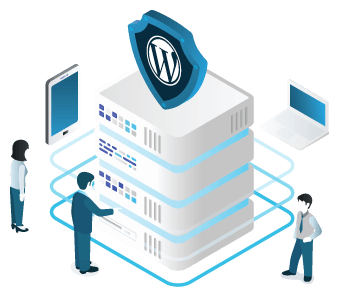Introduction
A good hosting service is crucial for the success of a website or online business. It ensures the website is accessible to users, operates smoothly, and is protected from security threats. This article highlights the important factors to consider when choosing a hosting service and guides evaluating and selecting the best hosting solution for your needs. The article will cover server reliability, scalability, security, cost, customer support, and more. By understanding the key considerations and evaluating your hosting needs, you can make an informed decision and find a hosting service that meets your website’s or online business’s unique requirements.
Factors to Consider When Buying a Hosting Service
A. Server Reliability and Uptime:
One of the most crucial elements to consider while selecting a hosting service is server reliability and uptime. The amount of time a server is accessible and available to users is known as uptime. A server with high uptime ensures that your website or online business is accessible and functioning properly, even during peak traffic. A good hosting service [for more: http://www.onohosting.com] should offer a service level agreement (SLA) that guarantees a certain level of uptime.
B. Scalability and Performance:
Scalability and performance are also important factors when choosing a hosting service. As your website or online business grows, you will need a hosting service to accommodate increased traffic and resource demands. A hosting service that offers scalable resources and good performance will ensure your website runs smoothly and provides a positive user experience.
C. Security Features:
Security is a critical concern for any website or online business. A good hosting service should provide robust security features, such as firewalls, secure data centers, and regular backups, to protect your website from security threats. The hosting service should also stay up-to-date with the latest security measures and provide regular security updates.
D. Cost and Budget:
Cost is a key factor to consider when choosing a hosting service. The cost of hosting services can vary greatly, so it’s important to evaluate your budget and determine what you are willing to spend. However, it’s important to remember that the cheapest option may only sometimes be the best choice. A good hosting service should provide value for money and balance costs and features.
E. Customer Support:
Customer support is an important aspect of a hosting service. A good hosting service should provide reliable and responsive customer support, available 24/7 through various channels.
F. Control Panel and Ease of Use:
A control panel is an interface to manage your hosting account and website. A user-friendly control panel with a simple, intuitive design can make it easy to manage your hosting service and website. The control panel should provide easy access to important features and resources, such as email accounts, database management, and website statistics.
G. Data Backup and Recovery Options:
Data backup and recovery options are important when choosing a hosting service. In the event of a catastrophe, such as a server crash or cyber-attack, a robust backup and recovery plan can help you quickly restore your website and protect your data. A good hosting service should provide regular backups, with the option to restore your website anytime. Additionally, it should offer fast and reliable data recovery options to minimize downtime and ensure your website and data are always protected.
In conclusion, choosing the right hosting service is crucial for the success of your website or online business. Consider factors such as server reliability and uptime, scalability, and performance, security features, cost and budget, customer support, control panel and ease of use, and data backup and recovery options. By evaluating your needs and evaluating possible hosting services against these important factors, you can find a hosting solution that meets your needs and supports the growth of your online presence.
Evaluating your Hosting service Needs
A. Understanding Your Business Requirements:
When evaluating your hosting service needs, it’s important to understand the specific requirements of your business. Consider factors such as the size of your website, the amount of traffic it receives, and the type of content you will be hosting. This information will help you determine the resources you need to host your website effectively.
B. Assessing Your Traffic and Resource Needs:
Another important factor to consider when evaluating your hosting service needs is traffic and resource requirements. Consider the amount of traffic your website will receive, and make sure your hosting service can accommodate that traffic and provide the necessary resources. It includes CPU, memory, storage, and bandwidth.
C. Evaluating Your Future Plans and Goals:
It’s also important to evaluate your plans and goals when choosing a hosting service. Consider how you plan to grow your website or online business over time. It will help you determine the scalability of your hosting service and ensure it can grow and evolve with your business. A good hosting service should be able to accommodate your plans and goals, including adding more resources as needed and should be able to support your website as it grows.
Choosing the Right Hosting Type
A. Shared Hosting:
Shared hosting is a cost-effective option for individuals or small businesses with lower-traffic websites. On a single server, several websites are housed as part of shared hosting, sharing the same resources. It is a great option for those just starting or with low-traffic websites, but it may not be suitable for websites with high-traffic or complex requirements.
B. VPS Hosting:
VPS hosting is a more advanced option that offers more resources and more control over your hosting environment than shared hosting. In VPS hosting, multiple virtual servers are created on a single physical server, providing each customer with their resources and control panel. It is a great option for small to medium-sized businesses with growing websites that need more resources and customization options.
C. Dedicated Hosting:
Dedicated hosting is the most advanced option, providing a whole server dedicated solely to your website. It is best for large businesses or websites with high traffic and complex requirements. Although dedicated hosting is more expensive than other hosting solutions, it offers the highest resources, performance, and control.
D. Cloud Hosting:
Cloud hosting is a newer hosting option that uses a network of virtual servers to host websites. It provides the scalability, performance, and reliability of dedicated hosting but with the cost benefits of shared hosting. Cloud hosting is a great option for businesses of all sizes with changing traffic and resource needs, as it can easily add or remove resources as needed.
Understanding the different hosting types and their advantages and disadvantages allows you to decide on the best option for your business.
Making the Right Choice For Your Business
A. Doing Your Research:
Before deciding, it’s important to research and compares different hosting providers. Look at their features and services, prices, and customer support. Take the time to understand your business requirements and assess your hosting needs to ensure you choose the right provider.
B. Reading Customer Reviews and Feedback:
Reading customer reviews and feedback can provide valuable insights into the experiences of other users. Look for reviews from customers with similar needs and requirements, and pay attention to common themes and issues that may be relevant to your decision.
C. Testing Your Hosting Provider:
Most hosting providers offer a trial period or money-back guarantee, allowing you to test their services before committing to a long-term contract. Take advantage of these trials to test your chosen provider’s performance, reliability, and customer support.
D. Consider Your Long-Term Needs:
When choosing a hosting provider, it’s important to consider your long-term needs. Think about the future growth of your business, and choose a provider that can grow with you and provide the resources you will need. Consider the scalability and performance of the provider, as well as their customer support and reliability, to ensure they can meet your needs now and in the future.
Conclusion
Choosing the right hosting service is crucial for the success and growth of your business. A reliable, secure, and efficient hosting solution is essential for ensuring the smooth operation and performance of your website or application and can help you to achieve your business goals and objectives.
In conclusion, choosing the right hosting service requires careful research and consideration. Evaluate your hosting needs, assess your business requirements, choose the right hosting type, and make an informed decision based on customer reviews and feedback. With the right hosting provider, you can enjoy the benefits of a reliable, secure, and efficient hosting solution and achieve the growth and success you want.

